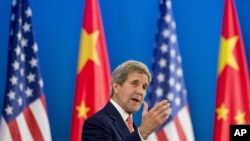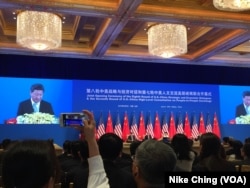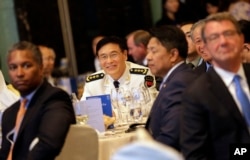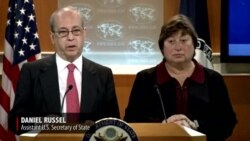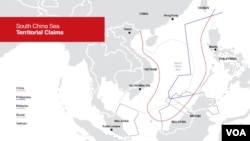U.S. Secretary of State John Kerry, speaking in Beijing at the start of the U.S.-China Strategic and Economic Dialogue, called on all parties in the region to "find a diplomatic solution" to rising tensions in the disputed South China Sea.
"We are looking for a peaceful resolution to the dispute in the South China Sea and oppose any country resolving claims through unilateral action," Kerry said, referring to China's increasingly aggressive expansion in the area.
Chinese President Xi Jinping, who also addressed attendees at the opening session, said China and the U.S. need to develop a more trusting relationship.
"China and the U.S. need to increase mutual trust," Xi said, as he called for increased efforts to manage conflicts and avoid "strategic misjudgement."
Saying that it may take time to settle disputes in the region, he added, "The vast Pacific should be a stage for cooperation, not an area for competition."
Air defense zone
Heading into high-level talks aimed at expanding cooperation with China, Kerry had urged China not to “unilaterally” announce an Air Defense Identification Zone (ADIZ) over portions of the South China Sea.
“We will consider an ADIZ over portions of the SCS as a provocative and destabilizing act,” said Kerry Sunday during a news conference after his meeting with Mongolian Foreign Minister Lundeg Purevsuren in Ulaanbaatar.
An ADIZ requires all incoming aircraft, including civilian planes, to register with Chinese authority to fly in the air route.
China announced an ADIZ in the East China Sea two years ago, which caused grave concerns by the United States.
Kerry’s remarks came after Asian defense ministers gathered in Singapore for the Shangri-La Dialogue where delegates debated as to where China is planning the creation of an ADIZ.
He said such an act will “automatically raise tensions and call into serious questions of China’s commitment to diplomatically manage” territorial disputes in the South China Sea.
In Singapore Sunday, a senior Chinese military official rejected U.S. Defense Secretary Ash Carter's assertion made the previous day that Beijing faces “erecting a Great Wall of self-isolation” if it continues its militarization in the South China Sea.
“We were not isolated in the past, we are not isolated now, we will not be isolated in the future,” retorted Admiral Sun Jianguo of the People’s Liberation Army.
Discussion of differences
A senior State Department official said the U.S. will not gloss over differences in thorny issues during the last round of Strategic and Economic Dialogue with China under the Obama administration.
“That includes our concerns with Chinese behavior in the South China Sea, [and] our concerns with things like the NGO management law and other forms of restrictions on human rights,” said Daniel Russel, assistant secretary of state for East Asian and Pacific Affairs, last Tuesday.
Russel was referring to a new Chinese law that affects American civil society organizations and their Chinese partners to operate in China.
Russel also expressed U.S. concerns about anti-business discriminatory regulations and “the use of cyber to disadvantage” U.S. companies.
He said the annual U.S.-China Strategic and Economic Dialogue has served as a venue “to discuss, and in some cases, to narrow our differences.”
WATCH: Assistant Secretary of State Daniel Russel.
Highlights of this year’s talks include environmental and ocean conservation, combating wildlife trafficking, and a new dialogue on commercial aviation systems, said Catherine Novelli, undersecretary of state for economic growth, energy, and the environment.
A landmark announcement by U.S. President Barack Obama and Chinese President Xi Jinping last year to implement bans on ivory imports and exports in domestic and commercial trade has made the ivory smuggling less lucrative in China.
“The price of ivory in China has decreased by half since the announcement,” said Novelli Tuesday.
Washington-Beijing diplomacy
The eighth round of annual U.S.-China Strategic and Economic Dialogue (S&ED) will be held in Beijing Monday and Tuesday.
The strategic track is led by Kerry and Chinese State Councilor Yang Jiechi. The economic track is led by U.S. Treasury Secretary Jacob Lew and Chinese Vice Premier Wang Yang.
Officials from dozens of U.S. federal agencies are set to attend the flagship dialogue between the two countries.
Anxieties have been growing in the region over China’s aggressive approach to its territorial claims in disputed waters in the South China Sea.
China is also ratcheting up demands that the U.S. should stop surveillance flights in the airspace above the South China Sea.
In a recent encounter, the U.S. Defense Department said two Chinese fighter jets intercepted in an unsafe manner a U.S. reconnaissance plane on a routine patrol in international airspace over the South China Sea, raising a "red flag" on implementation of existing Confidence Building Measures (CBM) between the two countries.
The measures were agreed to under previous rounds of S&ED that covers the rules of behavior for safety of air and maritime encounters. Both countries concurred to avoid accidents while their assets are operating in close proximity in places like the South China Sea.
Russel said the U.S. is seeking to “expand the scope of cooperation and establish broader frameworks” beyond what the two countries have with the Navy and the Air Force.
"Both sides do need to discuss this incident and understand what happened and talk about how they will avoid any of these kinds of very unsafe intercepts in the future,” Bonnie Glaser, regional expert from the Center for Strategic and International Studies, told VOA.
WATCH: Bonnie Glaser, director, CSIS China Power Project.
She added while a narrowing in differences between two countries over the South China Sea issue is unlikely, it is helpful to talk.
Cyber concerns
Another thorny issue is cyber security. The United States has clashed with China for years over cyber-enabled theft for commercial gain by state actors.
David Dollar, senior fellow of the Brookings Institution, told VOA the U.S. would follow through closely on a bilateral agreement during the coming high-level talks.
Dollar referred to an agreement reached last fall during Obama's meeting with Xi. Both countries agreed that neither government would conduct or knowingly support cyber-enabled economic espionage to advance business interests.
“This is a very big issue for U.S. companies,” he said. “U.S. companies have larger issues about intellectual property rights protection so this will continue to be an important issue.”
Starting in 2009, the Strategic and Economic Dialogue is an annual high-level mechanism between Washington and Beijing to discuss challenges and opportunities that both countries face on a wide range of bilateral, regional and global issues.




